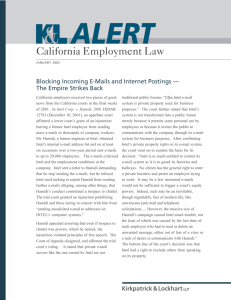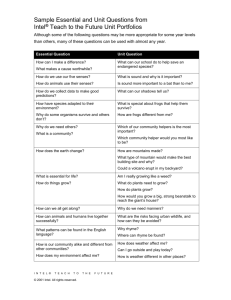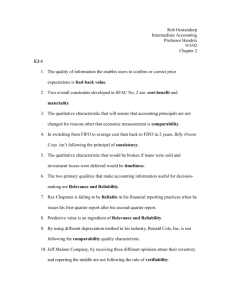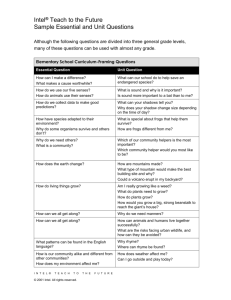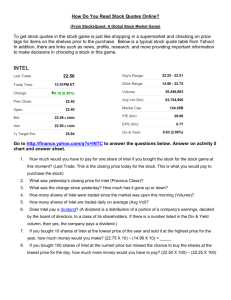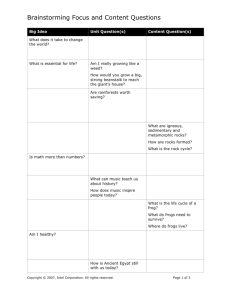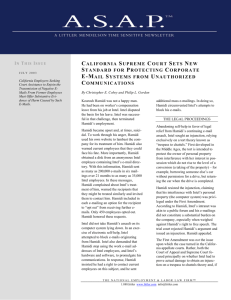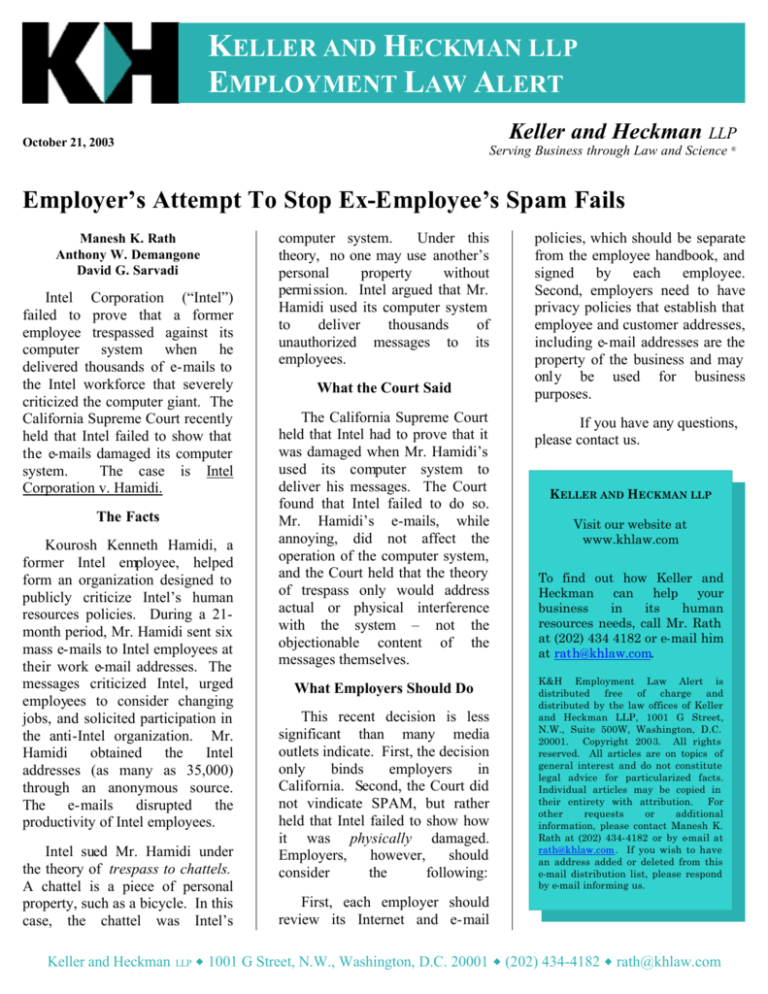
KELLER AND HECKMAN LLP
EMPLOYMENT LAW ALERT
Keller and Heckman LLP
October 21, 2003
Serving Business through Law and Science ®
Employer’s Attempt To Stop Ex-Employee’s Spam Fails
Manesh K. Rath
Anthony W. Demangone
David G. Sarvadi
Intel Corporation (“Intel”)
failed to prove that a former
employee trespassed against its
computer system when he
delivered thousands of e-mails to
the Intel workforce that severely
criticized the computer giant. The
California Supreme Court recently
held that Intel failed to show that
the e-mails damaged its computer
system.
The case is Intel
Corporation v. Hamidi.
The Facts
Kourosh Kenneth Hamidi, a
former Intel employee, helped
form an organization designed to
publicly criticize Intel’s human
resources policies. During a 21month period, Mr. Hamidi sent six
mass e-mails to Intel employees at
their work e-mail addresses. The
messages criticized Intel, urged
employees to consider changing
jobs, and solicited participation in
the anti-Intel organization. Mr.
Hamidi
obtained
the
Intel
addresses (as many as 35,000)
through an anonymous source.
The e-mails
disrupted
the
productivity of Intel employees.
Intel sued Mr. Hamidi under
the theory of trespass to chattels.
A chattel is a piece of personal
property, such as a bicycle. In this
case, the chattel was Intel’s
Keller and Heckman
LLP
computer system.
Under this
theory, no one may use another’s
personal
property
without
permission. Intel argued that Mr.
Hamidi used its computer system
to
deliver
thousands
of
unauthorized messages to its
employees.
What the Court Said
The California Supreme Court
held that Intel had to prove that it
was damaged when Mr. Hamidi’s
used its computer system to
deliver his messages. The Court
found that Intel failed to do so.
Mr. Hamidi’s e-mails, while
annoying, did not affect the
operation of the computer system,
and the Court held that the theory
of trespass only would address
actual or physical interference
with the system – not the
objectionable content of the
messages themselves.
What Employers Should Do
This recent decision is less
significant than many media
outlets indicate. First, the decision
only
binds
employers
in
California. Second, the Court did
not vindicate SPAM, but rather
held that Intel failed to show how
it was physically damaged.
Employers,
however,
should
consider
the
following:
policies, which should be separate
from the employee handbook, and
signed by each employee.
Second, employers need to have
privacy policies that establish that
employee and customer addresses,
including e-mail addresses are the
property of the business and may
only be used for business
purposes.
If you have any questions,
please contact us.
KELLER AND HECKMAN LLP
Visit our website at
www.khlaw.com
To find out how Keller and
Heckman
can
help
your
business
in
its
human
resources needs, call Mr. Rath
at (202) 434 4182 or e-mail him
at rath@khlaw.com.
K&H Employment Law Alert is
distributed
free
of
charge
and
distributed by the law offices of Keller
and Heckman LLP, 1001 G Street,
N.W., Suite 500W, Washington, D.C.
20001. Copyright 2003. All rights
reserved. All articles are on topics of
general interest and do not constitute
legal advice for particularized facts.
Individual articles may be copied in
their entirety with attribution. For
other
requests
or
additional
information, please contact Manesh K.
Rath at (202) 434-4182 or by e-mail at
rath@khlaw.com. If you wish to have
an address added or deleted from this
e-mail distribution list, please respond
by e-mail informing us.
First, each employer should
review its Internet and e-mail
® 1001 G Street, N.W., Washington, D.C. 20001 ® (202) 434-4182 ® rath@khlaw.com

